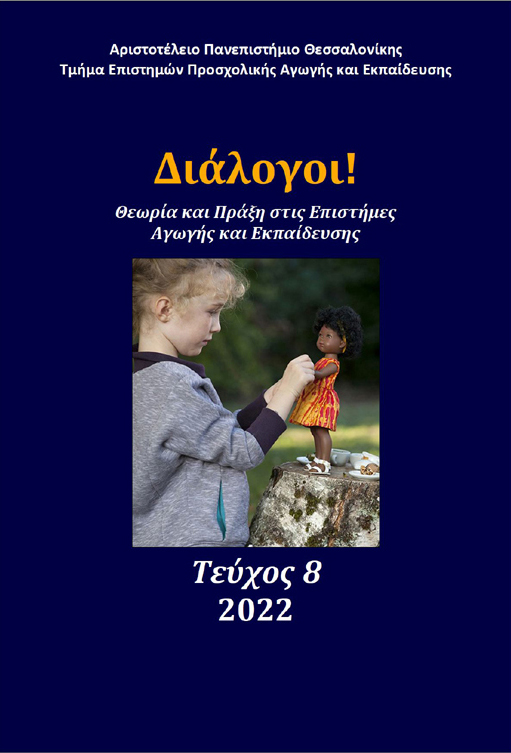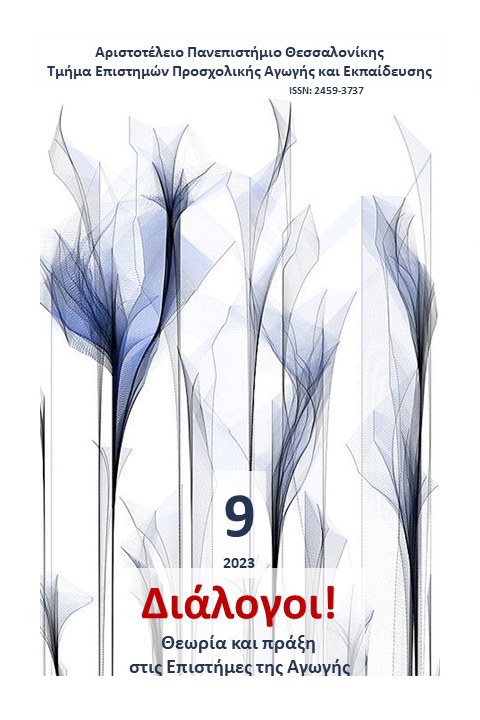Πρότυπα γυναικών στα σύγχρονα παιδικά βιβλία γνώσεων. Καταρρίπτοντας την έμφυλη ιδεολογική διχοτομία στον χώρο των Επιστημών

Περίληψη
Τα πραγματογνωστικά παιδικά βιβλία γνώσεων είναι έργα πολυτροπικά με μορφωτικό χαρακτήρα, που σκοπό έχουν να πληροφορήσουν παιδιά προσχολικής ή πρωτοσχολικής ηλικίας για οτιδήποτε τους περιβάλλει, μέσα από απλές και τεκμηριωμένες περιγραφές. Τα τελευταία χρόνια παρατηρείται η τάση των τέτοιων έργων να περιπλέκουν ηθελημένα το μυθοπλαστικό στοιχείο στις ιστορίες τους. Συχνά, η μορφή των σύγχρονων κειμένων είναι ιδιάζουσα, καθώς φέρουν χαρακτηριστικά της μυθιστορηματικής βιογραφίας, της αυτοβιογραφίας και των παιδικών εικονοβιβλίων, επιβεβαιώνοντας την υβριδικότητα του είδους. Εν προκειμένω, θα εξετάσουμε το έργο της Στέλλας Κάσδαγλη 30 γυναίκες που άλλαξαν τον κόσμο και πως μπορείς να τον αλλάξεις κι εσύ (2020), και τον Άτλαντα σπουδαίων προσωπικοτήτων. 101 προσωπικότητες της Ιστορίας που άλλαξαν τον κόσμο (2019) της Μιράλντα Κολόμπο. Θα μας απασχολήσει πώς οι συγγραφείς επιχείρησαν να πληροφορήσουν τα παιδιά για την ενασχόληση των γυναικών με τις Επιστήμες, με σκοπό να τα καταστήσουν επιστημονικά γραμματισμένα και να συμβάλλουν στη διακοπή της αναπαραγωγής διακρίσεων και ανισοτήτων, ιδιαίτερα όσον αφορά στην ενασχόληση των γυναικών με τις Επιστήμες και την Τεχνολογία.
Λεπτομέρειες άρθρου
- Πώς να δημιουργήσετε Αναφορές
-
Αγγελάκη Ρ.-Τ. (2022). Πρότυπα γυναικών στα σύγχρονα παιδικά βιβλία γνώσεων. Καταρρίπτοντας την έμφυλη ιδεολογική διχοτομία στον χώρο των Επιστημών. Διάλογοι! Θεωρία και πράξη στις επιστήμες αγωγής και εκπαίδευσης, 8, 285–302. https://doi.org/10.12681/dial.30585
- Τεύχος
- Τόμ. 8 (2022)
- Ενότητα
- Νέοι ερευνητές

Αυτή η εργασία είναι αδειοδοτημένη υπό το CC Αναφορά Δημιουργού – Μη Εμπορική Χρήση – Παρόμοια Διανομή 4.0.
Οι συγγραφείς των άρθρων που δημοσιεύονται στο Διάλογοι! Θεωρία και Πράξη στις Επιστήμες Αγωγής και Εκπαίδευσης διατηρούν τα δικαιώματα πνευματικής ιδιοκτησίας επί των άρθρων τους, δίνοντας στο περιοδικό το δικαίωμα της πρώτης δημοσίευσης. Άρθρα που δημοσιεύονται στο Διάλογοι! Θεωρία και Πράξη στις Επιστήμες της Αγωγής και Εκπαίδευσης διατίθενται με άδεια Creative Commons 4.0 και σύμφωνα με την άδεια μπορούν να χρησιμοποιούνται ελεύθερα, με αναφορά στον/στη συγγραφέα και στην πρώτη δημοσίευση για μη κερδοσκοπικούς σκοπούς και με δικαίωμα τροποποίησης μόνον με παρόμοια διανομή (αν αναμείξετε, τροποποιήσετε, ή δημιουργήσετε πάνω στο υλικό, πρέπει να διανείμετε τις δικές σας συνεισφορές υπό την ίδια άδεια όπως και το πρωτότυπο).
To Τμήμα Επιστημών Προσχολικής Αγωγής και Εκπαίδευσης του Αριστοτέλειου Πανεπιστημίου Θεσσαλονίκης και το Εθνικό Κέντρο Τεκμηρίωσης διατηρούν το δικαίωμα να δημοσιεύουν, να αναπαραγάγουν, να παρουσιάζουν στο κοινό, να διανέμουν και να χρησιμοποιούν άρθρα που δημοσιεύονται στο Διάλογοι! Θεωρία και Πράξη στις Επιστήμες Αγωγής και Εκπαίδευσης σε οποιοδήποτε μέσο και μορφή είτε μεμονωμένα είτε ως μέρη συλλογικών έργων, για όλο το χρόνο διάρκειας προστασίας της πνευματικής ιδιοκτησίας και για όλες τις χώρες του κόσμου.
Αυτό περιλαμβάνει ενδεικτικά, και όχι αποκλειστικά, το δικαίωμα δημοσίευσης των άρθρων σε τεύχη του περιοδικού Διάλογοι! Θεωρία και Πράξη στις Επιστήμες Αγωγής και Εκπαίδευσης, αναπαραγωγής και διανομής μεμονωμένων αντιγράφων των άρθρων, αναπαραγωγής ολόκληρων των άρθρων σε άλλη έκδοση του Τμήματος Επιστημών Προσχολικής Αγωγής και Εκπαίδευσης του Αριστοτέλειου Πανεπιστημίου Θεσσαλονίκης και του Εθνικού Κέντρου Τεκμηρίωσης και αναπαραγωγής και διανομής των άρθρων ή περίληψης αυτών με χρήση πληροφορικού συστήματος αποθετηρίου.



